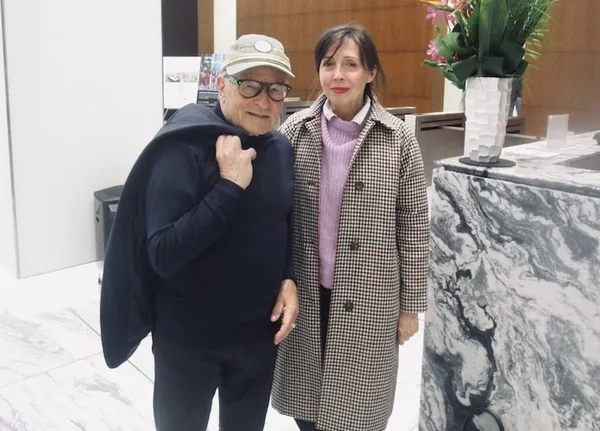Jonathan Coe’s imaginative and savvy novel, Mr. Wilder & Me, which centres on the making of Billy Wilder’s penultimate movie, Fedora, (starring William Holden, Marthe Keller, Hildegard Knef, Michael York) seen through the lens of a fictional Greek composer named Calista, credits Volker Schlöndorff as an important source.
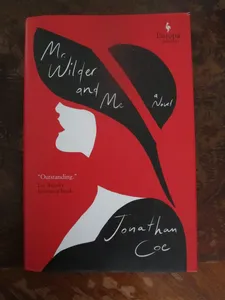 |
| Jonathan Coe’s Mr. Wilder And Me (Europa Editions), collection Anne-Katrin Titze Photo: Anne-Katrin Titze |
I met Volker at the Austrian Cultural Forum’s Hedy Lamarr: Actress. Inventor. Viennese exhibition to discuss his role in the research for the novel, which led us into a wide-ranging conversation that included his documentary series Billy, How Did You Do It?, touring with The Forest Maker (winner of the Hamptons International Film Festival Victor Rabinowitz and Joanne Grant Award for Social Justice), Sam Shepard and Voyager (Homo Faber), Wim Wenders (recently at Cannes with Perfect Days and Anselm, his 3D Portrait of Artist Anselm Kiefer) and Werner Herzog; Billy Wilder watching Steven Spielberg’s Schindler’s List and Wilder’s response to the furore over Volker’s Oscar acceptance speech for The Tin Drum, Marie Kreutzer’s Corsage and Margarethe von Trotta’s Ingeborg Bachmann - Journey Into The Desert (both starring Vicky Krieps), and meeting Frédéric Boyer (Tribeca Film Festival Artistic Director) in Bergamo.
I was first introduced to Volker Schlöndorff by screenwriter Michael Schulz at the Babelsberg Studio cafeteria in the mid-1990s. Over the years we stayed in touch with conversations on his film adaptations, including The Tin Drum (co-written by Jean-Claude Carrière and Franz Seitz), Cyril Gely's play Diplomatie (Diplomacy, starring Niels Arestrup and André Dussollier),and Arthur Miller's Death Of A Salesman (with Dustin Hoffman as Willy Loman).
We also spoke about Volker’s time working with Alain Resnais on Last Year In Marienbad and being an intern on Louis Malle's Zazie Dans Le Métro; shooting Return To Montauk (co-written with Colm Tóibín); honouring Voyager collaborator Sam Shepard, Nobel Prize-winning author Günter Grass, screenwriter Jean-Claude Carrière, and close friend Andrzej Wajda; the lecture '68: A Long Time Coming he gave at the University of Notre Dame, and his documentary The Forest Maker on agronomist Tony Rinaudo.
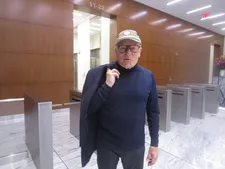 |
| Volker Schlöndorff on Jonathan Coe’s Middle England winning the European Book Prize: “We gave the award to that book, which I liked very much.” Photo: Anne-Katrin Titze |
He presented a pre-première screening of The Ninth Day to my class at Fordham University at Lincoln Center in 2005 and joined us for a discussion. Volker invited me on the sets in 2016 for his film Return To Montauk, where for a scene on the steps of the New York Public Library (on Fifth Avenue and 42nd Street), I awaited (along with Margarethe von Trotta and Pam Katz) Stellan Skarsgård and Colm Tóibín to greet us.
Pet Shop Boys 2023 video for The Lost Room features clips from Volker Schlöndorff’s Young Törless (Der Junge Törless, winner of the Cannes Film Festival FIPRESCI Prize in 1966) and he recently received the German Film Honorary Award for Outstanding Contributions to German Cinema.
Anne-Katrin Titze: Meeting at the Hedy Lamarr exhibition gave us a lot of options where to chat. Plus there is the Austrian connection to Billy Wilder. How did you first encounter Jonathan Coe?
Volker Schlöndorff: Jonathan Coe’s previous novel, Middle England [2018] I think it was called, was submitted for the European book award, a literary award. And I’m in the jury, so I read it. It was a very nice book about, well, exactly the middle land of England - the middle-class living in the middle of the country. Middle lives, so to speak, very poignant and carefully written about people with no importance, which is kind of the main part of England. Let’s call it the silent majority.
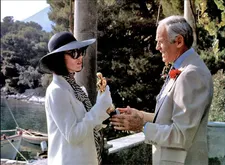 |
| Marthe Keller and Henry Fonda in Billy Wilder’s Fedora |
So we gave the award to that book, which I liked very much. Funny enough, half a year later he showed up in my home in Potsdam, had made an appointment and wanted to talk about Billy Wilder, which I’m always happy to do. He had seen, of course, the three-part BBC series, Billy, How Did You Do It?, and just wanted to know more. Especially wanted to know more about Fedora.
AKT: Because you were on the set of Fedora!
VS: Yes and also, at least in the edited version of Billy, we didn’t go into Fedora, nor the Sherlock Holmes, because Billy wasn’t very eloquent about it, so we didn’t have a lot of material.
AKT: Fedora is such a strange strange film. Before we go into that - you mentioned a jury. This morning right before meeting you, I got off Zoom with Tribeca Film Festival Artistic Director Frédéric Boyer and he said you had met in Bergamo!
VS: In Bergamo! Beautiful guy, yes.
AKT: He sends his greetings to you from Paris. I didn’t even know Bergamo had a film festival.
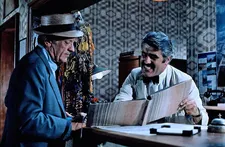 |
| William Holden and Mario Adorf in Fedora |
VS: Thank you! Actually, it’s called the Bergamo Film Meeting. They have specially one guest per year - that was me. They made a full retrospective with a beautiful catalogue. So I was not on the jury, he was on the jury for the rest of that little festival.
AKT: I see. Back to Wilder!
VS: So Jonathan Coe - we shared our enthusiasm. I told him everything I knew about Fedora and the shooting of Fedora in Munich. Then a year later he sent me his novel and he found out a lot more about Fedora that I didn’t know. So when the book was published in Germany, we did a presentation together in Berlin for the publishers. Had I known that a movie is going to be made of it, I don’t know what my reaction would have been.
AKT: Please explain!
VS: First of all, I would have thought: who cares? Even with the book I was astonished that such a book would be published and translated because where would be the audience for this today? He’s a classic, but film students in Germany or in this country - wherever I go - hardly know him. Most of them, at least in Berlin, never saw Some Like it Hot and actually never saw a movie with Marilyn Monroe.
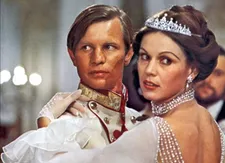 |
| Michael York and Marthe Keller in Fedora |
AKT: True, yes.
VS: So it’s a completely different generation.
AKT: Which is the topic of Fedora! Which is the topic of the book!
VS: The world moved on.
AKT: The world moved on but the world is also, I think, in search of something else. I noticed that the very last endnote in the book is about the visit with you.
VS: Oh is it?
AKT: Yes, when he mentions Billy Wilder watching Schindler’s List.
VS: Oh yes, yes, and Billy said “That’s my mother!” He pointed to the extras when they were taken out of Kraków, pointed to one of them and said “That is my mother.” Of course these were extras from the Eighties.
AKT: It’s an impressive passage in the book, that he forgot that he was watching a fictional movie, someone like Wilder forgetting this. Wilder after the war saw the actual footage of the liberation of the death camps and in this context there is another footnote to your series. He describes seeing a field of corpses.
 |
| Volker Schlöndorff at the Austrian Cultural Forum Hedy Lamarr: Actress. Inventor. Viennese exhibition Photo: Anne-Katrin Titze |
VS: And the one who keels over.
AKT: Yes, precisely. And while reading the novel I was wondering: why do I know this? It is in your interview!
VS: Yes, he tells this story, absolutely. Among other images of horror, there’s always one that sticks out, a different one for every viewer. That then remains and you can’t forget it. So it was not the last man standing, it was the last man falling or the last man dying.
AKT: There were things in the novel that amazed me. The set of Irma La Douce became the interior of Wilder’s restaurant?
VS: Oh yes, the bistro on Rodeo Drive or somewhere in this very chic part of L.A.. With Alex Trauner [his production designer] they conceived it from the beginning in such a way that they could take it apart and take it to town and open a restaurant. Isn’t that what John Huston did with Night of the Iguana, where they built all these houses in Puerto Vallarta? Which is the wilderness and then it became a real estate deal! You could be a filmmaker and be clever nevertheless!
AKT: Ha, how true!
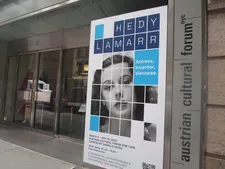 |
| Hedy Lamarr: Actress. Inventor. Viennese exhibition at the Austrian Cultural Forum Photo: Anne-Katrin Titze |
VS: But that place, the bistro, with me still resonates, because after the Academy Awards with The Tin Drum, he took me there with Bette Midler and others and they all misunderstood my acceptance speech. When I said this being the first Academy Award for a German film since World War II, for good reasons we all know. All of a sudden there was this silence in the auditorium. A total misunderstanding!
They thought that they had prevented it - a German film from getting an award. I meant, there were no good films. And my speech went on of course, and we, the generation of Werner and Wim tried to bridge the gap from 1933, from that period of filmmaking to now. I got scolded, I think in the Morning Show. I think Johnny Carson said “this young German who wanted to teach us a lesson.”
AKT: Oh no!
VS: At the same time that I had gained the glory, I lost it with my acceptance speech. And Billy was so adamant, he understood exactly what I meant. And he knew me well enough that I wouldn’t criticise the Academy or the Hollywood community in any way and got into dispute with Bette Midler and others who were there at the bistro. It was wonderful to have his plaidoyer to back me up, but it didn’t erase the effect I made.
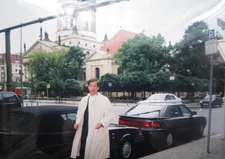 |
| Screenwriter Michael Schulz introduced me to Volker Schlöndorff at the Babelsberg Studio cafeteria in the mid-1990s Photo: Anne-Katrin Titze |
AKT: It’s “aus gutem Grund” and although the translation is exactly “for good reason”, there are language nuances that can’t be translated.
VS: Yeah, so much so, that in retrospect you may wonder if there was a good reason of the other kind. No, I must say that in all these 40 years or how many, I never ever felt any anti-German sentiment in the Hollywood community. Quite the opposite, I felt especially welcomed because of being a German, and not despite. Anyway that was the bistro. Now we get back to …
AKT: … to Fedora. And speaking of The Tin Drum, Mario Adorf is quite bizarrely cast in Fedora as the Greek hotel manager, isn’t he?
VS: Yes, but he often played Italian or Greek. His specialty and the most money were the Italian spaghetti westerns where he always played the mean, mean guy. Always the gangster while he is such a charming man. He played a Greek man in Peter Fleischmann’s adaptation of the Greek novel about the regime of the Greek colonels there [La faille]. He’s still around, I saw him a month ago in Berlin.
AKT: The Tin Drum connections are everywhere. A film I haven’t seen yet but am looking forward to seeing is Frauke Finsterwalder’s Sisi & I [judging from the clips, Angela Winkler has a moment involving food that links easily to the famous eels].
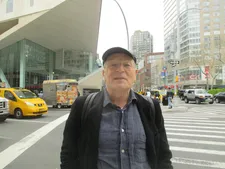 |
| Volker Schlöndorff on Sam Shepard and Voyager (Homo Faber): “He was so helpful also with the dialogue or with the running of certain scenes.” Photo: Anne-Katrin Titze |
VS: I haven’t seen it either. Did you see Corsage?
AKT: Yes, I saw Corsage and spoke with Marie Kreutzer and also Vicky Krieps. Vicky and I also talked about Margarethe’s Bachman and Frisch film.
VS: Yes that’s coming out in October. It was at the Berlinale, I don’t remember whether it got any international reviews. I hear that the German reviews were mixed. But then it’s impossible, because everybody thinks they knew who Bachman really was and who Max Frisch really was. To have the two of them in one film, everybody will know better either way or the other. It’s a real obstacle to overcome. On the other hand, their correspondence, which was published after Margarethe made the film, was a number one bestseller. So there will be a lot of interest for the movie anyhow.
AKT: I am looking forward to seeing it.
VS: Coming back to Coe’s novel, it would never ever have occurred to me to make a movie of it, while I’m completely convinced now with this combination from the outside - with Stephen Frears, Chris Hampton, and above all the casting of Christopher Waltz!
AKT: You can see him as Wilder?
VS: Oh yeah, absolutely, as a great actor who can do anything. But especially impersonating Billy Wilder is not that difficult. I mean you could never equal him, but you could impersonate because he is continuously performing. I guess to impersonate Gandhi must be difficult because you cannot use any tricks of an actor.
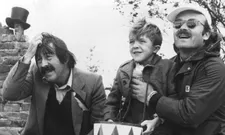 |
| Günter Grass with David Bennent, Oskar in The Tin Drum, and Volker Schlöndorff |
Whereas Billy, the moment he enters a room, it’s a performance, you know? The way he cracks a joke immediately, the way he wears his hat, the way he starts improvising a waltz - so Christoph Waltz also for the waltz is very good, ha! And behind all the facade of, you know, whatever people called cynical, is of course Billy Wilder, the very dead-serious moralist.
AKT: Good point.
VS: Which he’s been hiding in his movies. As he said, yeah, yeah, there’s always a cover of chocolate. But if you scratch it a little bit you will find a strong moral attitude. He was certainly not happy while making Fedora because he felt all along that something was wrong. The first warning was of course that it couldn’t be made in Hollywood.
I mean, a Billy Wilder movie not being made in Hollywood? With an IAL Diamond script? That is already astonishing. That refers to this joke when he came to United Artists or was it Paramount? The new board, and they were all around 30, these young CEOs. They said “Mr. Wilder, it’s such an honour to have you. Thanks for coming to see us. Just for the sake of my young colleagues here, would you mind to tell us a bit about you and the films you made?” And Billy replied; “You first!”
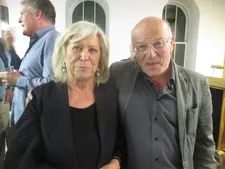 |
| Volker Schlöndorff on Margarethe von Trotta’s Ingeborg Bachmann - Journey into the Desert: “There will be a lot of interest for the movie anyhow.” Photo: Anne-Katrin Titze |
AKT: That’s great! That’s it.
VS: That’s it. He had to go with tax shelter money, financed in Munich. He always joked about it when people asked: Why do you come to Germany? Is this a return to make the movie? And he said “No, that’s because that’s where the money is.” Which is the bank robber joke. Audrey, his wife, was furious when he cracked that joke because she felt that diminishes him.
That he had to go where the stupid money is and couldn’t get it done anymore where the intelligent money is. I mean, as a filmmaker we know that if you face certain difficulties but you want to do it anyhow, you may end up being too stubborn. Something, be it the script, the cast, or the subject was not of its time anymore.
AKT: Films come in waves. There are moments in Coe’s novel, which I thought were very well described, that speak of how much he still has to give. And it’s just not wanted at this moment in time of the “kids with beards.”
VS: Yeah, I’ve just been teaching at Dartmouth and I can’t complain. Students were extremely well prepared and had seen at least six or eight of my movies.
AKT: What did you teach?
VS: Just generally filmmaking - films and literature. I made the most unlikely choice for the prestige major screening for all the academia. I chose Voyager, because it’s been practically not released in the United States. It’s one of Sam Shepard’s finest performances.
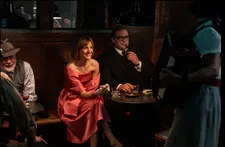 |
| Vicky Krieps as Ingeborg Bachmann with Ronald Zehrfeld as Max Frisch in Ingeborg Bachmann - Journey Into The Desert |
AKT: Yes.
VS: And Julie Delpy’s as well. And a movie I love very much. First they said this is a very daring choice. I said “why?” Well, it is so intellectual and there’s this incest story and all that. The audience didn’t have a problem at all with that. If there was any cultural gap between the movie and the audience it was the fact that he is so severely punished by the death of his own daughter, even though he couldn’t know it. So he didn’t deserve such punishment.
And the answer was, well, in Greek tragedy the thing is that the gods strike blindly. It is not a Protestant culture where you get rewarded if you are honest and hard-working and where you get punished if you do the wrong thing. No, with Greek tragedy it’s blind. Destiny falls in one way or the other. That for the young students was very disturbing, almost like - then it’s not worthwhile making an effort.
AKT: I spoke with Sam Shepard about that film. I think I told you about it.
VS: Yes.
AKT: It was one of the films he mentioned to me as being in his head for a long time after. Homo Faber was important for him.
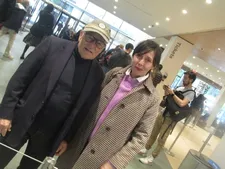 |
| Volker Schlöndorff with Anne-Katrin Titze at the Museum of Modern Art, the end of this day’s journey Photo: Cornelia von Maltzahn |
VS: I showed it because we also just had finished the restoration. I had a very good DP [Pierre Lhomme] and the photography and everything were just splendid. Also as a gesture for Sam who had been very important in the making. Being difficult, of course, but all good guys are difficult. He was so helpful also with the dialogue or with the running of certain scenes. He became more and more silent and gave the dialogue away to the other actors so that he only had to say yes or no. A bit like Gary Cooper.
AKT: That is a good comparison. Anything coming up for you?
VS: No, I’m not sure that I’ll make another movie. I don’t say never again, but the landscape changed so much. Every Monday I get the figures from the arthouses in Europe and nobody goes there anymore.
AKT: You had just done a tour of many of them for The Forest Maker!
VS: Yes, because it was the only way to get the film to be seen. When you make an event of it that you come to and talk to to the audience. There’s still an interest in cinema and I think cinemas have a future but they really have to make a great effort to give the audience more than just play a movie. Every show has to be an event somehow. It has to be within a program, has to be curated. For the moment I don’t want to do anything without an urge that it has to be done.
AKT: Do you have any leftover footage from your Billy Wilder interviews?
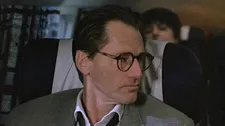 |
| Sam Shepard as Walter Faber in Volker Schlöndorff's Voyager |
VS: Not concerning Fedora. We have leftover footage, of course, but we never really spoke much about Fedora. Whatever I had on Fedora I made available to Jonathan.
AKT: And in general, for you to do a follow-up to the Billy Wilder series?
VS: No, there’s not enough there worthwhile. There’s the three-hour version which we made for the BBC, which they’re going to repeat soon, to replay next month or so, which I’m very happy about. We also have a five-and-a-half hour version which was made for German television.
AKT: Thank you, Volker, always great to hear your Billy Wilder stories!
VS: Thank you, Anne-Katrin!
AKT: Let me walk you over to MoMA! I recently was at the press preview for the Georgia O’Keeffe exhibit called It Takes Time To See.
VS: Let’s go!
Europa Editions will launch Mr. Wilder And Me in paperback this summer.








